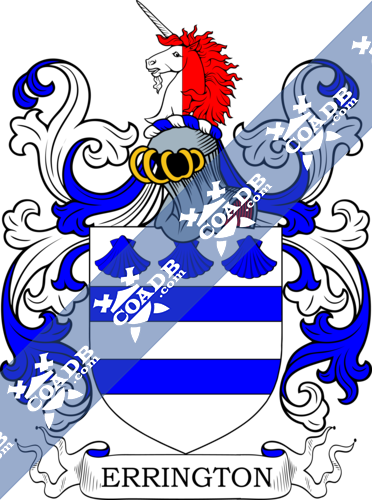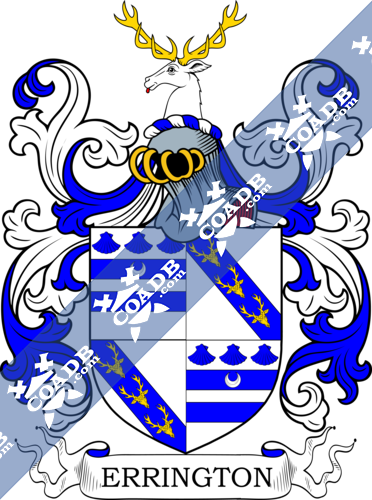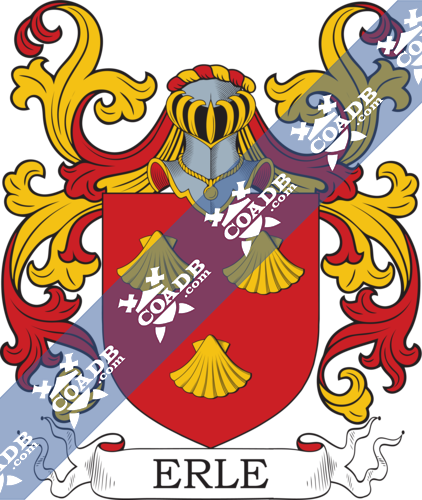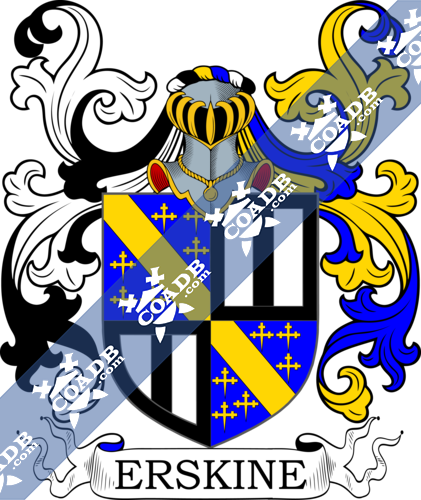Errington Family Crest, Coat of Arms and Name History
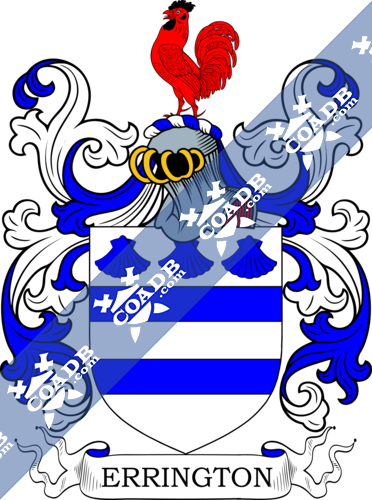
Errington Coat of Arms Gallery
Don’t know which Coat of Arms is yours?
We can do a genealogical research. Find out the exact history of your family!
Learn MoreErrington Origin:
England
Origins of Errington:
This surname is of mixed British and Anglo-Saxon origin and is a geographical name from a place thus called, located on the river Erring in Northumberland. The river name is British (pre-Roman) and associated with the Welsh “arian,” which means silvery, shiny, and “ton” acquires from the Olde English pre 7th Century “tun,” which means enclosure, hamlet. So, the whole meanings of the name are “Hamlet on the shiny water source.” Geographical names were formerly given to the king of the palace, or as a source of recognition to those who departed from their place of origin to settle to another place. Regional and provincial differences consequently formed many changes on the real spelling of the name, and in 16th Century Parish Records of Yorkshire and Northumberland, the surname appeared as Haryngton, Herrington, Erington and Errington. In August 1573, Elynor Errington, a new-born baby, named in St. Nicholas Parish, Newcastle-Upon-Tyne, Northumberland. A remarkable name ancestor was John Edward Errington (1806 – 1862), a civil engineer, who built refuge works in Greenock (1841), and brought forward the entire system of railways from Lancaster to Inverness.
Variations:
More common variations are: Yerrington, Erringtonn, Earrington, Erington, Yearrington, Arrington, Earington, Yerington, Orrington
England:
The surname Errington first appeared in Northumberland where they held a family seat from very old times. Some say well before the Norman Invasion and the coming of Duke William at Hastings in 1066 A.D.
The very first recording spelling of the family was shown to be that of Ellen Haryngton, dated about 1510, in the “Birth Registers of York City,” Yorkshire. It was during the time of King Henry VIII who was known to be the “Bluff King Hal,” dated 1509 – 1547. The origin of surnames during this period became a necessity with the introduction of personal taxation. It came to be known as Poll Tax in England. Surnames all over the country began to develop, with unique and shocking spelling varieties of the original one.
Ireland:
Many of the people with surname Errington had moved to Ireland during the 17th century.
United States of America:
Individuals with the surname Errington landed in the United States in two different centuries respectively in the 17th, and 19th. Some of the people with the name Errington who arrived in the United States in the 17th century included Abraham Errington who settled in Charleston Massachusetts in 1630. Thomas Errington settled in Salem Massachusetts in 1635. Richard Errington settled in Virginia in 1642. Richard Errington, who arrived in Virginia in 1642. Thomas Errington, who landed in Lynn, Massachusetts in 1642.
The following century saw much more Errington surnames arrive. Some of the people with the surname Errington who arrived in the United States in the 19th century included James Errington, who landed in Salem, Massachusetts in 1768.
Australia:
Some of the individuals with the surname Errington who landed in Australia in the 19th century included Thomas Errington arrived in South Australia in 1851 aboard the ship “Omega.” Margaret Errington arrived in South Australia in 1851 aboard the ship “Reliance.” William Errington, a British Prisoner from Gibraltar, who shifted aboard the “Aboukir” in December 1851, settling in Van Diemen‘s Land, Australia. Joseph Errington arrived in South Australia in 1857 aboard the ship “Lady Ann.”
New-Zealand:
Some of the population with the surname Errington who arrived in New Zealand in the 19th century included John Errington landed in Wellington, New Zealand in 1842.
Here is the population distribution of the last name Errington: England 2,753; United States 1,040; Australia 680; South Africa 420; Canada 293; Germany 134; Scotland 118; New Zealand 80; Wales 45; Singapore 24
Notable People:
Sir Eric Errington, 1st Baronet (1900–1973), was a British advocate and Conservative Party leader.
Frank R. Errington (1890–1958), was a British diver who played in the 1908 Summer Olympics.
George Errington (bishop) (1804–1886), was a Roman Catholic priest.
Sir George Errington, 1st Baronet (1839–1920), was an Irish leader and MP for Longford.
Grant Errington was an Australian Educator (born 1958), Developed the introduction of Vocational Education and Training in NSW High Schools 2002.
Blazons & Genealogy Notes
1) (Errington and Beaufront, co. Northumberland). (Walwick Orange and High Warden, co. Northumberland, and Hele, co. Wilts; a branch of Errington, of Errington). Ar. two bars, in chief three escallops az. Crest—A cock gu. combed and wattled sa.
2) (Cassina, near Colchester, co. Essex). (Ponteland, co. Northumberland). (Chadwell Hall, and Lexden Park, co. Essex, and Ashbourne, co. Derby). Same Arms. Crest—A unicorn’s head erased per pale ar. and gu.
3) (Hooton, co. Chester, bart., and Sandhain House, co. Northumberland. Rowland Stanley, Esq., second son of Sir Thomas Stanley, ninth bart. of Hooton, assumed by royal licence, 1820, the surname of Errington only; he s. his brother, Sir William Thomas Stanley Massey Stanley, tenth bart., as eleventh bart., 1863. Sir Thomas Stanley Massey Stanley, ninth bart., m. 1805, Mary, only dau. and heir of Sir Carnaby Haggerston, fifth bart. of Haggerston, by Frances his wife, dau. of Walter Smyth, Esq., of Brambridge, co. Hants, and Maijy Errington his wife, sister and eventual heiress of Henry Ebrington, Esq., of Sandhoe, co. Northumberland, descended from John Errington, second son of Gilbert Errington, Esq., of Errington, temp. Edward IV.). Quarterly, 1st and 4th, Errington, same as the preceding, a crescent for diff.; 2nd and 3rd, Stanley, ar. on a bend az. three stags’ heads cabossed or. Crest—A stag’s head couped at the neck ar. attired or, the tongue hanging out gu.

